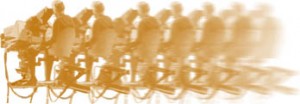Chris Woolf
I delight that we were all involved in a fascinating activity, which had a crucial place in history – but for all sorts of reasons it is history, and we need to remember that. The industry does continue, even if not in form that we always admire, and it is wise to remember what the real skills we have learnt are.
They weren’t really the ability to push a ped around the floor or swing a Mole boom around – the real purpose was to produce a shot, a visual image, or to get atmospheric, clean sound. Those skills are still important – the fact that the camera is a mobile phone and the mic is a modular array doesn’t change that.
The park-bench is a comfy place to chat from, but it would be a pity of those of us of a certain age only ever looked backwards.
Alan Taylor
I would quibble with one thing that Chris Woolf said,
“…the real purpose was to produce a shot, a visual image, or to get atmospheric, clean sound. Those skills are still important – the fact that the camera is a mobile phone and the mic is a modular array doesn’t change that…”.
I have always maintained that our real purpose was to tell a story for the viewers, to communicate an idea. Obviously we all care about the finer aspects of our craft, but that must never get in the way of the programme. Clearly there is a balance to be struck. We needed to maintain and hopefully improve standards, but we couldn’t exist in ivory towers either.
There are times when it appears to have swung too far the wrong way these days. There are clearly opportunities for exploiting consumer quality equipment for programme making and some of those shows have worked well. I would pick out Mary Beard doing her lockdown arts review programmes from her home, Mark Kermode and Simon Mayo working from their respective homes and some of the programmes of people walking in the wilds carrying a camera on an invisible stick. Those programmes did something quite unlike what went before and were interesting anyway. However that doesn’t mean that the technical bar needs to be lowered to that level for other programmes.
Television has always changed rapidly. It had changed out of all recognition before any of us started in the business, it drastically changed during our working lives and continues to evolve. Things which we struggled to achieve with our technology can now be done by clicking a mouse. Things we never imagined possible are now done routinely.
We were mostly operational staff. Inventors and engineers leave a legacy of hardware for future generations. You can examine a windmill or a steam engine and get a pretty clear idea of how it was made. Operational staff leave a different legacy. It’s hard to take apart a video recording and deduce how it was made if you don’t already know most of the answers. Some of us tried to make our contribution natural and unnoticed.
One of the important things that this group can achieve is to put on record how our jobs used to be done, because modern programme making is for the most part done very differently these days. Not necessarily better and not necessarily worse, but certainly different.
Chris Woolf
“…I have always maintained that our real purpose was to tell a story for the viewers, to communicate an idea…”
We’re not far apart on any of this. I’d argue that the story part is the director’s effort, necessarily combined with the crew working as a team – so I was simply talking about the individual efforts that go to make up the whole. But it is a marginal distinction that I wouldn’t want to push.
You are quite right that craft skills can only be detected by someone who has studied that craft closely. That certainly applies to TV and film operations, but equally to blacksmiths, stone masons, carpenters and every other such skill. They should be valued very highly because a proper understanding of our national history and culture is based absolutely on such understated skills.
Perhaps the saddest part about British culture is the artificial status ladder that our society imposes on such activities. Craft skills are most often “dirty hands” ones, and the Brits regard such jobs as menial, and impossible that they can be carried out by people of education and taste. It is a remnant of our damaging class-structure, and a terrible restraint on our development. While the lauded architect draws beautiful ideas, with trees in front to disguise the bits that don’t quite work, the structural engineer and the fabricator who have the task of making the bloody thing stand up are rarely recognised.
I find it wonderful that top-class academic engineers (that I know) in Germany think nothing of being peasant-style farmers in their spare time – and nobody sees any contradiction.
[Ed: there is more on the contribution of Tech Ops to Drama here: The Camera is an Actor in the Drama]
Dave Plowman
If you look at the sort of social meja youngsters use, it is full of those complaining about poorly paid dead-end jobs. Yet few even consider the trades. And a decent plumber or electrician etc can make very good money – as well as having a varied job. Which they could take pride in.



